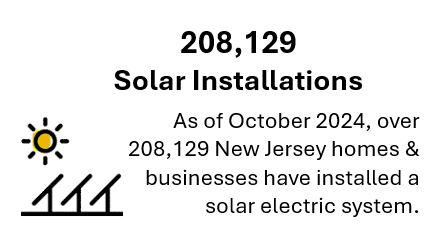Community Solar Energy Program (CSEP)
|
Community Solar Energy Program (CSEP) Virtual Stakeholder Meeting December 3, 2024 (3:00 - 4:00 PM EST) To register for the Zoom Virtual Webinar, click here. Additional information can be found in the Public Notice. |
The Community Solar Energy Program (CSEP) provides incentives to eligible community solar facilities to enable the continued efficient and orderly development of solar electric generating sources throughout New Jersey.
As defined at N.J.A.C. 14:8-11.7, the New Jersey Board of Public Utilities (NJBPU) set an annual capacity allocation based on an energy year basis. For Energy Year 2024, the CSEP opened with a capacity block of 225 MW which was divided among the four Electric Distribution Company (EDC) territories: Public Service Electric and Gas Company (PSE&G) and Jersey Central Power & Light Company (JCP&L) Atlantic City Electric Company (ACE) and Rockland Electric Company (RECO) service territories. The CSEP opened the registration online portal to new registrations on November 15, 2023. The 225 MW (dc) has been fully subscribed.
Per Board Order dated April 30, 2024, the Board acts to implement the legislative mandate by expanding the original 225 MW capacity under the Community Solar Energy Program to include an additional 275 MW (dc). This capacity will be allocated among the four EDCs: 33 MW for ACE, 79 MW for JCP&L, 158 MW for PSE&G, and 5 MW for RECO service territories. Any capacity remaining as of June 1, 2024, will be set as the initial CSEP capacity block for the associated EDC for EY 2025. The CSEP online portal will be open to new CSEP registrations on May 15, 2024, at 12:01 AM EST.
Solar facilities that have been conditionally awarded an incentive in the SuSI Program, including in the CSEP, or in the Transition Incentive Program are not eligible to submit a new registration in the CSEP until its initial conditional registration expiration date has passed.
CSEP Registration Online Portal
The Community Solar Energy Program (CSEP) Registration Portal opens to new registrations on May 15, 2024 at 12:01 am (EST).
Registrants must submit an CSEP Initial Registration package with all required documents through the CSEP Registration Online Portal. The CSEP Initial Registration package must include all the documents listed on the CSEP Initial Registration Checklist(s) which can be found below and on the CSEP portal homepage.
The CSEP is open to eligible solar facilities installed on the following site types: (1) Rooftops (2) Carport and Canopies (3) Floating Solar (4) Contaminated Sites and Landfills defined at N.J.S.A. 58:10B-1 and N.J.A.C 14:8-1.2 and (5) Mining Sites, defined as a sand mine, gravel pit, or mine on land classified as “Extractive mining” in Level II of the modified Anderson classification system within the most recent Land Use/Land Cover GIS data layer produced by the NJDEP, exclusive of forested land.
Frequently Asked Questions for Developers
CSEP Solar Installer Training was conducted on October 27, 2023, at 10:00 AM EST:
CSEP Capacity Blocks by Electric Distribution Companies (EDC)
The CSEP will accept new registrations on a first-come, first-served basis until the megawatt block for that EDC market segment is fully subscribed or until June 1, 2025, whichever comes first. When the EDC megawatt block has been fully subscribed, the CSEP Manager will close the registration portal to new registrations for that particular EDC capacity block and no new registrations will be accepted under that capacity block. There will not be a waiting list for projects seeking to enter an EDC capacity block for a capacity block that is already fully subscribed. Capacity blocks will be set annually by the Board.
A capacity block is defined as being fully subscribed when the last registration received in the CSEP registration portal causes the total capacity of all registrations in that EDC block to exceed the capacity allocated for that capacity block. Registrations will be reviewed on a first-come, first-served basis and the capacity for each registration under the status of Accepted will be counted toward the allocated capacity of the relevant EDC capacity block.
An initial registration period will run May 15, 2024, to May 29, 2024, at 11:59 PM EST, during which all registrations may be submitted and will be considered tied with respect to time of submission. If a capacity block has received registrations to be fully subscribed during this period, as a tiebreaker, projects will be reviewed in the order of the guaranteed bill credit discount, starting with the highest discount.
Projects accepted into the CSEP will be listed in the Installation Data and Pipeline Data spreadsheets in the Solar Activity Reports.
Energy Year 2025 CSEP Capacity Block (Effective June 1, 2024 - May 31, 2025)
| EDC Territory | MW (dc) Capacity Blocks EY 2025 | Capacity Subscribed MW (dc) | Capacity MW (dc) |
| Jersey Central Power & Light (JCP&L) | 144 MW | CLOSED | CLOSED |
| Public Service Electric & Gas (PSE&G) | 287 MW | CLOSED | CLOSED |
|
Atlantic City Electric (ACE) |
60 MW | CLOSED | CLOSED |
| Rockland Orange (RECO) | 9 MW | 4.1 | 4.8 |
Note: Table includes cumulative capacity
Community solar facilities that previously participated in the TI Program that were unable to complete are eligible to participate in the CSEP and are not subject to the above EDC capacity caps. See below.
CSEP Capacity Block for Projects that Previously Participated in the TI Program (Year 1 and Year 2 Community Solar Pilot Program)
The solar capacity for any new CSEP registration for solar facilities that previously participated in the TI Program that were unable to complete by the established deadline can participate in the CSEP. The capacity for these solar facilities will not be counted toward the 275 MW (dc) set out in the above table. Community Solar projects that participated in the TI Program must commit to the guaranteed bill credit discount consistent with that indicated in their original Community Solar Pilot Program application to be exempt from the above capacity limits.
The table below reflects capacity for new registrations in CSEP that previously participated in the TI Program:
| Capacity Subscribed MW (dc)* |
| 3.736 |
*Not subject to the EDC Capacity Caps in above table
Community Solar Incentive Levels
| Market Segment | System Size MW (dc) | SREC-II Incentive Value |
| Community Solar | Solar Facilities up to 5 MW | $90 |
Community Solar Facilities are not eligible for a public adder
15 Year SREC-II Qualification Life
Escrow Requirements
The Board requires that the registrant post escrow with the Board in an amount of $40.00 per kilowatt of DC nameplate capacity of the solar facility. Public entities and community-based organizations, which must be entities registered under section 501(c)(3) of the Internal Revenue Code, would be exempt from this requirement subject to Board Staff approval. The escrow amount will be reimbursed to the registrant in full upon receipt of permission to operate (“PTO”) and submission of a CSEP Post-Construction Certification (Final As-Built package, pursuant to N.J.A.C. 14:8-11.5(j). Projects seeking an exemption should email, [email protected], with justification for an exemption with evidence of public entity or non-profit status. The escrow amount shall be forfeited to the State if the facility does not commence commercial operation before the conditional registration expires. For solar facilities awarded a conditional registration in Energy Year 2024, evidence of escrow is due one year after a project receives a notice of conditional registration. The Board is in the process of obtaining an escrow agent and will notify conditionally accepted projects how to post escrow in the coming months.
Board Orders
Pursuant to the Clean Energy Act of 2018 (L. 2018, c.17) and the Solar Act of 2021 (L. 2021, c. 169), the New Jersey Board of Public Utilities (NJBPU) established a new permanent Community Solar Energy Program (CSEP) by Board Order dated August 16, 2023. The CSEP replaces the Community Solar Pilot Program which was closed to new registrations on February 5, 2021. The CSEP provides incentives to eligible community solar facilities to enable the continued efficient and orderly development of solar electric generating sources throughout New Jersey. The CSEP is open to eligible solar facilities installed on the following site types: 1) Rooftops 2) Carport and Canopies 3) Floating Solar and 4) Contaminated Sites and Landfills defined at N.J.S.A. 58:10B-1 and N.J.A.C 14:8-1.2.
The rules establishing the Community Solar Energy Program were published in the New Jersey Register on October 7, 2024. A notice of proposed substantial changes upon adoption was also published in the New Jersey Register on October 7, 2024. The deadline for written comments on this matter is 5:00 p.m. on December 6, 2024.
Per Board Order dated May 10, 2023, the Board set the Administratively Determined Incentive (“ADI”) Program megawatt (“MW”) block allocations for Energy Year (“EY”) 2024, which runs from June 1, 2023 through May 31, 2024. The EY2024 MW block allocations expire on May 31, 2024, and will immediately be replaced by the EY2025 allocations. The ADI Program will therefore carry forward without interruption; the Board has made no change to the ADI Program incentive values at this time.
Per Board Order dated July 28, 2021, IN THE MATTER OF A SOLAR SUCCESSOR INCENTIVE PROGRAM PURSUANT TO P.L. 2018, C.17, the ADI Program would be open to net metered residential projects; net metered non-residential projects at or below 5 MW; and all community solar projects.
For information about the Pilot Program, see here.
CSEP Key Eligibility Requirements
- Any CSEP Registration with a solar facility sized over 5 MW (dc) will automatically be rejected.
- CSEP is open to eligible solar facilities installed on the following site types: (1) Rooftops (2) Carport and Canopies (3) Floating Solar and (4) Contaminated Sites and Landfills defined at N.J.S.A. 58:10B-1 and N.J.A.C 14:8-1.2 and (5) Mining Sites, defined as a sand mine, gravel pit, or mine on land classified as “Extractive mining” in Level II of the modified Anderson classification system within the most recent Land Use/Land Cover GIS data layer produced by the NJDEP, exclusive of forested land.
- Solar developers participating in the CSEP are required to post escrow with the Board in an amount of $40.00 per kilowatt of DC nameplate capacity of the solar facility. See Escrow Section above for detailed information.
- Solar project owners or their developers must follow the interconnection process required by New Jersey law at N.J.A.C. 14:8-1 through 14:8-5.9 and facilitated by their Electric Distribution Company (EDC).
- The solar equipment must be new. N.J.A.C. 14:8-11.4 (c) The equipment used in an CSEP-eligible facility must be new; that is, none of the equipment may have been used prior to the installation. (Racking, meter, inverter, modules).
- Solar facilities must be connected to a distribution or transmission system owned or operated by a New Jersey public utility.
- Solar facilities receiving incentives that are 1 MW (dc) or greater in size are subject to the Prevailing Wage Act N.J.S.A. 34:11-56.25, et seq.
- All community solar projects must reach permission to operate on or before the expiration date noted in the CSEP acceptance letter.
- SREC-IIs will be available for qualifying CSEP projects for period of 15 years, pursuant to N.J.A.C. 14:8-11.
- SREC-II value is set at $90/MWh for all projects.
- Community solar projects are not eligible to receive a public entity adder.
- Solar facilities on contaminated site or landfills are subject to New Jersey Solar Erosion and Sediment Control Act N.J.S.A. 4:24-39 et seq, its implementing rules at N.J.A.C. 2:90 and NJDEP’s Stormwater Management rules under N.J.A.C. 7.8.
- CSEP does not permit dual-use solar facilities on farmland.
Community Solar Facilities are prohibited in the CSEP from "Commencing Construction," (defined as obtaining permission to operate or PTO) prior to receipt of acceptance into the CSEP program. Solar facilities that obtain PTO prior to the issuance of the CSEP acceptance letter will be required to petition the Board of eligibility in the CSEP program.
CSEP Initial Registration Requirements
- CSEP Initial Registration Checklist
- CSEP Community Engagement and Acquisition Plan Form
- CSEP Registration Certification Form
- CSEP Milestone Reporting Form (Quarterly Report)*
- Community Solar Permit Form
- NJ Department of Environmental Protection Permit Readiness Checklist
- Contaminated Site and Landfill Eligibility Verification Form (if applicable)
*A CSEP Milestone Reporting Form is required to be submitted with the initial CSEP registration package and quarterly thereafter, up until the submission of the Final As-Built (Post Construction Certification) Package.
Identifying Major and Minor Deficiencies in your CSEP Registration Package:
As the CSEP Registration is reviewed, it will either be accepted or deemed incomplete. This document explains how the CSEPI Program Team identifies minor and major deficiencies within your CSEP Registration packet.
An initial registration period will run, to May 29, 2024, at 11:59 PM EST, during which all registrations may be submitted and will be considered tied with respect to time of submission. In the event that a capacity block has received registrations to be fully subscribed during this period, as a tiebreaker, projects will be reviewed in the order of the guaranteed bill credit discount, starting with the highest discount.
NOTE: Please be advised, if your CSEP Registration package is rejected and the EDC capacity block has been fully subscribed, you will no longer be eligible to submit a new CSEP registration in this capacity block. The CSEP online portal will be closed for new registrations under that EDC block, and you will be required to wait until the next capacity block is opened to submit a new registration.
CSEP Final As-Built (Post Construction Certification) Package
- CSEP Final As-Built Checklist
- CSEP Final As-Built Technical Worksheet
- Post-Construction NJDEP Compliance Form - to be posted at a later date
NJCEP reserves the right to request a complete copy of production estimates, a full shade analysis, or any relevant documentation from the installer at any time.
PV Watts/System Advisor Model (SAM)
CSEP Requirements for Decreases and Increases to the Solar System
CSEP solar facilities are permitted to increase up to 20 percent or 25 kW whichever is smaller. If, after submittal of an initial CSEP Registration package, an increase of up to 20 percent or 25 kW (dc) in the solar electric generating facility's generating capacity is planned, the registrant is required to notify the NJBPU at [email protected] and the CSEP Processing Team at [email protected]. An CSEP solar facility cannot increase the system’s capacity that would expand the project beyond 5 MW (dc).
For CSEP solar facilities that previously participated in the Community Solar Pilot Program, the system size can increase up to 20 percent or 25 kW (dc) from the capacity conditionally approved in the associated Board Order. The solar facility cannot increase the system’s capacity that would expand the project beyond 5 MW (dc). The CSEP does permit decreases to the original system size that was submitted with the initial CSEP registration.
Co-Location
Co-location is not permitted in the CSEP, unless the Board grants a waiver to a petition N.J.A.C. 14:8-11.4(f). Co-location is defined as siting two or more SuSI-eligible solar facilities on the same property or on contiguous properties such that the individual facilities are eligible for a higher incentive value or different program than they would be if they combined into one single facility. Community solar facilities located on rooftops on separate buildings and different properties regardless of ownership are not considered co-located. Furthermore, a community solar facility and a net metered facility are not deemed co-located if they serve separate customers. If the review of the Post Construction Certification (Final As-Built) packet or project inspection reveal that the registrant failed to disclose co-located solar facilities, the Board may take enforcement action, including but not limited to adjusting the incentive downward by multiplying the aggregated project size by the lowest incentive level among the projects’ qualifying market segments.
For solar facilities that were previously conditionally approved in the Pilot Program and are reapplying in the CSEP, the prohibition on co-location is waived.
Extension Policy
CSEP solar facilities accepted in the CSEP may be eligible for one 6-month extension. The registrant may apply for an extension for any solar installation that cannot complete the installation and submit a complete Final As-Built (Post Construction Certification) package with permission to operate from the Electric Distribution Company in the CSEP online registration portal on or before the expiration date noted in the CSEP Acceptance Letter.
Extension Requests will be reviewed and considered on a case-by-case basis and should include supporting documentation of extenuating circumstances for the delay in completing the facility, evidence that the facility has made progress towards completion, and demonstrations of the likelihood of timely and successful completion of the solar facility. When deciding on the extension request, CSEP team will consider whether the registrant has submitted timely quarterly milestone reporting forms. If the extension is granted, the CSEP will provide a new registration expiration date six months from the expiration on the original conditional CSEP Acceptance Letter.
Any CSEP solar facility that would like to submit a request for a second extension must submit a petition to the NJBPU, for consideration. Instructions on how to file a petition can be found at How to File a Petition.
Program Contacts
Correspondence and inquiries should be directed to:
New Jersey's Clean Energy Program
Successor Solar incentive (SuSI) Program
Administratively Determined Incentive (ADI) Program’s
Community Solar Energy Program (CSEP)
[email protected]
Phone: 866-NJSMART (866-657-6278)








.jpg)
